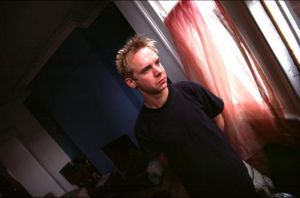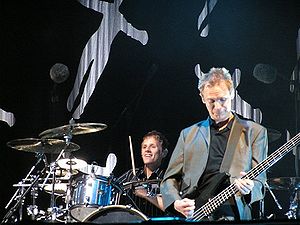Morgan Nicholls
The fourth member of Muse?
The "fourth member" of Muse some might say. However, like bands such as R.E.M., Muse still remain officially a three piece band. He is (or was, until recently) only needed for live performance purposes and will not feature in any interviews or promo photos.
History of the man called Morgan
Nicholls originally played bass in the punk band Senseless Things (also featuring drummer Cass Browne - who later went onto playing with Gorillaz, guitarist Ben Harding and frontmant Mark Keds, who passed away in 2021), and they gained a couple of top 20 hits in the 90s. He then was involved in the band Vent 414 until the late 90s, before going on to pursue a solo career under the name 'Morgan' and released the album "Organised". Between 2003 and 2008, Nicholls has been playing bass for The Streets (though he is said to have enjoyed a beer with Mike Skinner from time to time according to this NME interview). After that, he played bass with Gorillaz during the Demon Days era, both in the studio and live (contributing to perhaps one of the most recognisable bass lines of "Feel Good Inc." and probably becoming the inspiration for Gorillaz character Murdoc Niccals, knowing Jamie Hewlett, who designed The Senseless Things' artworks, even prior to Damon Albarn), Lily Allen (2009, when he was also her tour director[1] , and 2014) and even The Who (performing on a couple one-off performances in 2012, most notable being the Olympics Closing Ceremony). The same year (2012) he released another solo EP, "Moonlight Rhino". In 2018, he, together with Browne, Des Murphy and Ade Emsley, formed a psychedelic punk band "Circle 60". In 2019, The Senseless Things reunited for their final, one-off show, at London's Shepherds Bush Empire.
In 2004, Nicholls filled in for Wolstenholme when he broke his wrist after a friendly football match with the Cooper Temple Clause (Didz gave him a proper tackle). According to NME, it seems that Wolstenholme was a bit tight with his bass guitars, as a result of which Nicholls had to use his own. It was to a point where when Nicholls left his bass in Leeds, and had nothing to play in Reading, he had to borrow a bass off the bassist from the Amplifier. When Nicholls was filling in for Wolstenholme, Muse were already contemplating having him stay on as a permanent keyboard player.[2] His first show as a keyboard player with Muse was in 2006.
Future for Morgan
Ever since his first show as the fourth member, Nicholls played a big part in Muse's live shows, playing keyboard, bass (Hoodoo), guitar, synthesisers, keys and percussion, to avoid the band having to use backing tracks.
The only times he had missed concerts was in the USA during 2006, due to him not having a US work Visa. In 2009 Morgan's wife gave birth to their baby which caused Morgan to take time off playing with Muse in order to spend time with his family. He was replaced by Alessandro Cortini, at the time a former live-Nine Inch Nails keyboardist, during the Admiralspalast gig and the Walter Kerr Theatre gig (which also was a part of the MTV VMA's) in 2009. Morgan later joined Muse for their tour supporting U2.
In May of 2022, after 18 years with Muse, Nicholls announced on his Twitter, that he'll not be touring with Muse, at least on the Will of the People tour, wishing the band, the crew and the fans "all the very best".[3] He was replaced by multi-instrumentalist and producer Dan Lancaster.
Gear
Bass
Songs used for
- Headup riff
- Hoodoo
- All the songs at 2004 V Festival
Cabasa
Songs used for
Drums
Songs used for
Glockenspiel
Songs used for
Guitar
Songs used for
- Back in Black
- Dead Inside
- Follow Me
- Madness
- Starlight
- Sunburn
- United States of Eurasia
- Uprising
- Something Human
- Thought Contagion
Keyboards & Synthesizers
Keyboard is Morgan's main instrument for live performances along with a synthesizer, playing most songs on it, and controlling backing tracks via MIDI
Tambourine
Songs used for
Ukulele
Songs used for
Shaker
Songs used for
Kaoss Pad
Songs used for
- Riffs & Outros
- Stockholm Syndrome
- Knights of Cydonia
- Isolated System
- Montpellier Jam
- Nishe
- Unnatural Selection
References
- ↑ http://www.telegraph.co.uk/culture/music/4223221/Llly-Allen-uncertain-smile.html
- ↑ "It's a new category of epicness" (2004-09). Retrieved from Crikey. Need a domain here, kthnxbye.
- ↑ https://twitter.com/CaptMorganized/status/1523703554564796418
Back to Muse

